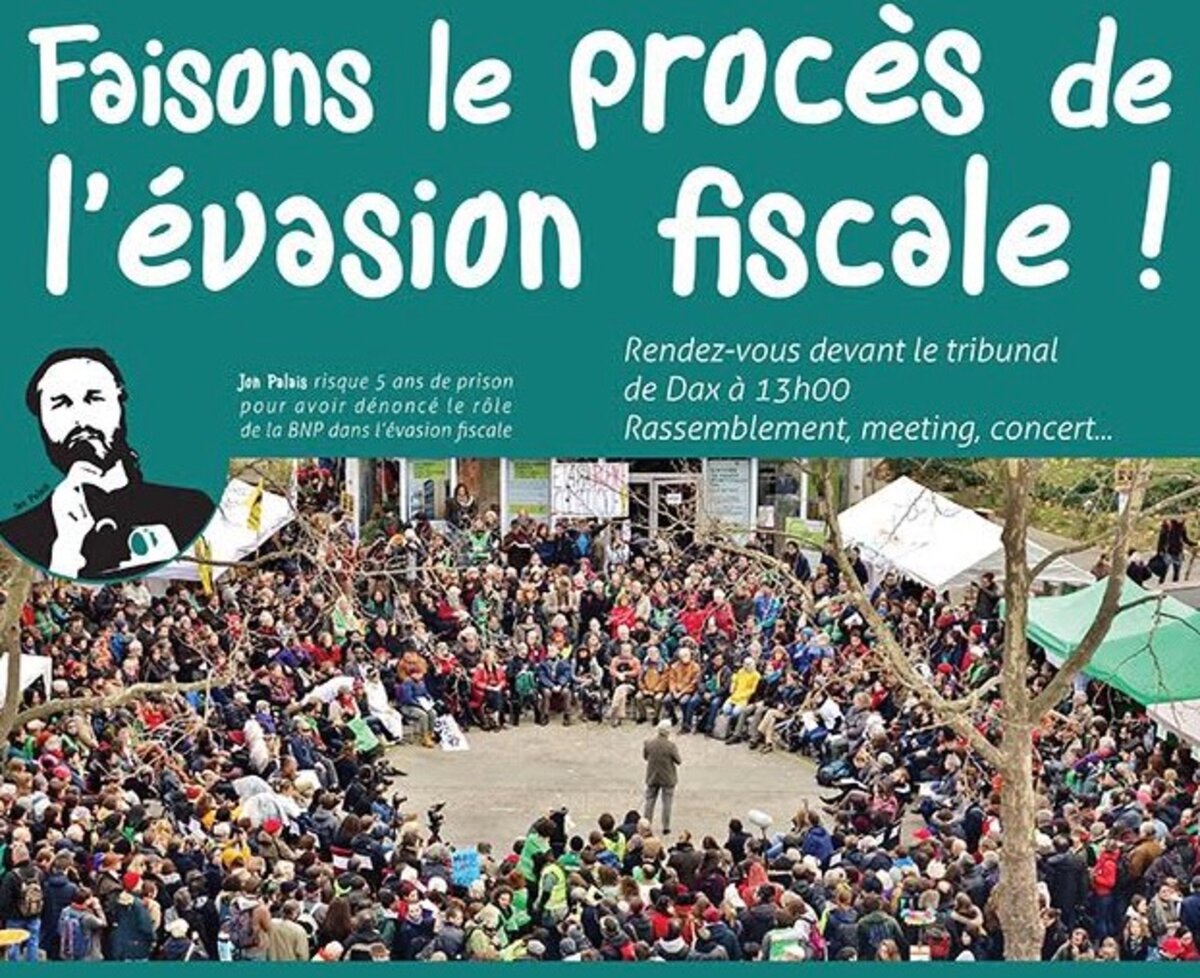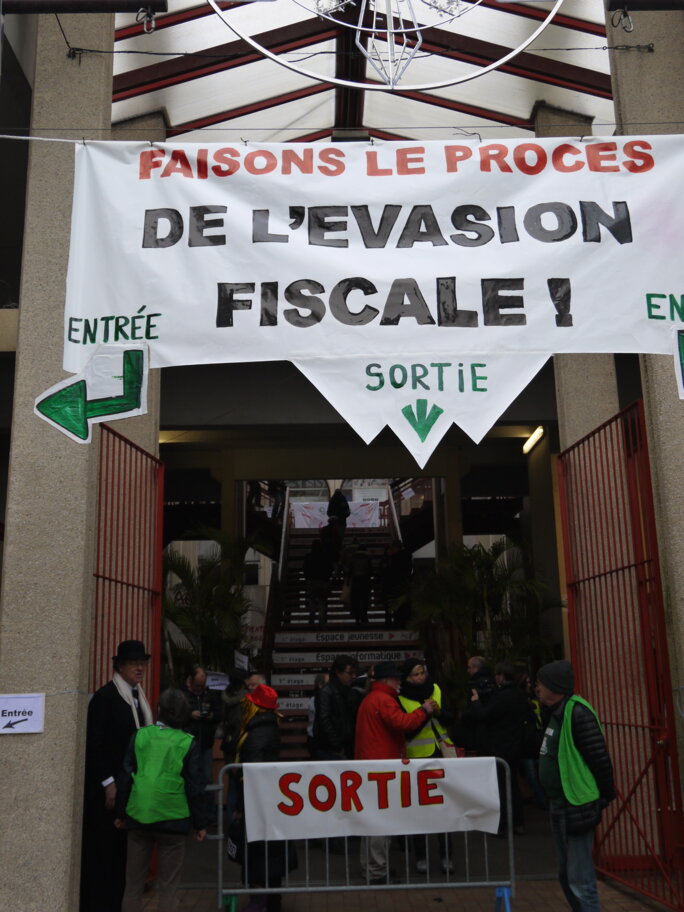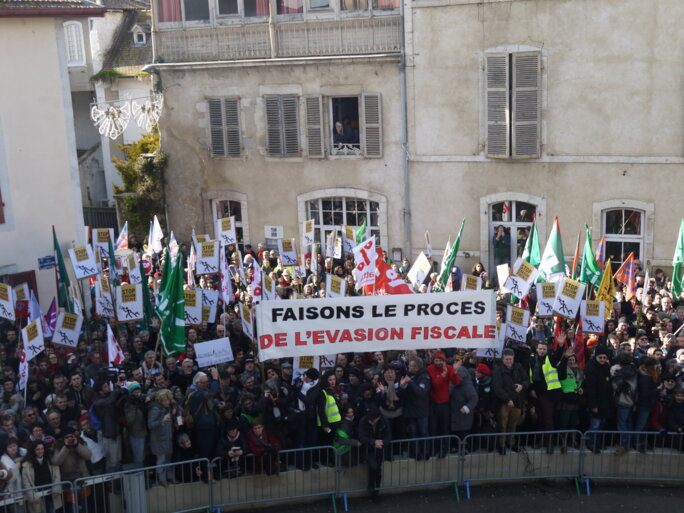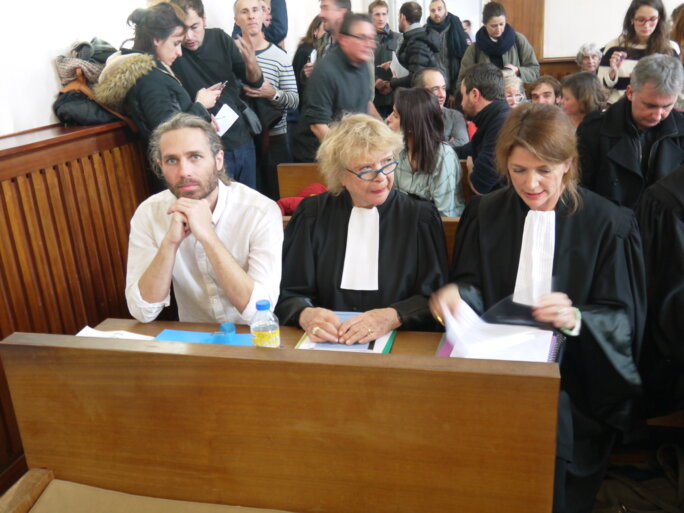It is a fair bet that if the French bank BNP Paribas had known how events would turn out, they would not have made a formal complaint against so-called “chair pinchers”. The trial of one of the activists who had taken the bank's chairs in a self-styled “citizen requisition” to highlight tax evasion took place at Dax in south-west France on Monday January 9th. It did not go too well for the giant financial institution.
For one thing, the hearing attracted hundreds of campaigners who came to support Jon Palais and turned the occasion into a very public demonstration against tax evasion and French banks' involvement in tax havens. For another, the justice system itself seemed notably well-disposed towards the activist defendant who says he was taking part in a non-violent act of civil disobedience. The court prosecutor in fact argued that Palais should be acquitted.
It is quite possible that the bank had felt events moving against them some time before Monday's hearing, as even though they are civil plaintiffs joined to the criminal proceedings – and claiming a symbolic one euro in damages and interest – neither a representative of the bank nor any of its lawyers were present for the hearing in Dax.

Enlargement : Illustration 1

The facts of the case are straightforward. On October 19th, 2015, some 25 activists wearing fluorescent jackets entered a branch of BNP Paribas bank at rue de Rivoli in Paris and took away 14 chairs. They first explained the reasons for the action to bank staff, and repeated them later in an online video in which Jon Palais officially admitted his involvement. Palais is a very committed activist involved with two associations from the Basque region Bizi! and Alternatiba, plus Action non violente-COP21 (ANV-COP21), which he founded. He and his friends took part in the chair pinching after an appeal launched on September 29th, 2015, in Libération by associations and public figures such as Friends of the Earth, the ATTAC anti-globalisation group, Bizi!, radical left politician Jean-Luc Mélenchon, sociologist Edgar Morin and comedian Christophe Alévêque.
The idea was to “borrow” 196 chairs before the COP21 climate conference in Paris starting that November from the branches of banks that have the greatest presence in tax havens. They were to be used at a citizens' summit where they were to represent the 196 countries taking part in COP21. The aim was to highlight the urgency of taking action on climate along with the problems in delivering a transition to renewable energy when hundreds of billions of euros are hidden in tax havens.
The citizens' summit duly took place and around 40 protest actions in bank branches produced rather more than chairs than forecast. Protesters handed over 196 chairs to police in a symbolic gesture on February 8th, 2016, the day when the fraud trial of disgraced former budget minister Jérôme Cahuzac was due to begin (it was then postponed). The remaining chairs were publicly handed over to well-known figures who supported the movement, from former banker Claude Alphandéry to former socialist prime minister Lionel Jospin.
Meanwhile the head of the BNP Paribas branch that had been visited on October 19th, 2015, made a formal legal complaint in the name of the bank and proceedings were initiated. Palais was identified from his video and the proceedings targeted him. Was a trial justifiable in view of the facts of the case? “The justice system focuses on the story of the chairs, but of course these borrowings didn't have the slightest impact on the financial health of the bank,” Palais told Mediapart just before this week's hearing. “My action makes no sense if it's not connected with the citizen and political dimension of this civic action: our problem isn't with the fact that there are chairs in bank branches but that the banks play a major role in tax evasion.” As far as Jon Palais is concerned it was not he who should be on trial but tax evasion itself. And he and his friends had some success in turning the trial in that direction.
Throughout the day of the trial hundreds of people - the organisers optimistically said 2,000 – came together in the Les Halles covered market in the town which had been leant to them by Dax's socialist mayor, Elisabeth Bonjean, in return for a promise that the site would be left tidy and undamaged. People of all ages were present, dressed in fluorescent sports strips marked ANV-COP21, tee-shirts emblazoned with Bizi! and white Greenpeace tops.
Inside the covered market was a stage ready for a concert by singer Alexis HK next to a artisanal brewery and stalls providing food in solidarity with the protest. Small announcements about car-sharing gave a clue as to how far people have travelled to be here: from Paris, Nantes, Bordeaux, Toulouse, Perpignan and Grenoble, for example. Television and radio journalists had also come to report on the protest. Among the journalists present was Xavier Harel, who has made a documentary on tax evasion and who is now making a new one on banks for public sector broadcaster France Télévisions.

Enlargement : Illustration 3

In the morning, in a room bursting at the seams, a round table was organised by ATTAC, Friends of the Earth and the umbrella group set up to fight against tax havens the Plate-forme Paradis Fiscaux et Judiciaires. It featured two presidential candidates, Yannick Jadot of the the green alliance EELV-Les Verts and Philippe Poutou of the anti-capitalist NPA, representatives of the would-be socialist candidate Benoît Hamon and the radical left presidential candidate Jean-Luc Mélenchon, plus Pierre Larrouturou from the left-wing Nouvelle Donne party, and Charlotte Marchandise who won the primary election to choose a “citizens'” candidate. The European Member of Parliament and anti-globalisation campaigner José Bové was present later in the day. His political colleague, the former judge and green presidential candidate Eva Joly, was meanwhile there in her capacity as Jon Palais's defence lawyer, as was her daughter Caroline Joly, who is also a lawyer.
The economist and president of ATTAC, Thomas Coutrot, told the round table meeting that France loses 60 billion to 80 billion euros a year as a result of tax evasion. To this one should add, he said, the 40 billion to 60 billion euros lost due to tax optimisation policies pursued by multinationals, including French ones. “The money to finance energy transition exists, we have to go and look for it,” said Coutrot. It was a recurring theme of the day.
The ATTAC economist recognised that some progress had been made in recent years and that one should be “pleased” about that. These advances include the automatic exchange of tax information between countries which is now a reality for around a hundred countries, with Switzerland and Luxembourg having joined in on January 1st this year. European banks are also now under an obligation to detail all their subsidiaries around the world, giving their business activity, their profits and the taxes they pay. And former budget minister Jérôme Cahuzac was duly convicted at his trial for tax fraud late last year. But Coutrot pointed out: “The states are simply reacting under the pressure of public opinion in the face of unacceptable scandals, revealed by the media or whistle-blowers” . He also noted that the country's highest authority on constitutional issues, the Constitutional Council, has just struck down two measures aimed at fighting tax evasion, in the name of business freedom.
The green presidential candidate Yannick Jadot was greeted with applause when he called for banks to be taken to court “for a blatant lack of civic behaviour and for tax fraud” and attacked the way senior officials switched jobs between government ministerial offices, the civil service and banks. Philippe Poutou was clapped, too, when he called for the “expropriation” of banks.
Prosecutor calls for an acquittal
By hearing the case at Dax, near where Jon Palais lives, rather than in Paris where the events occurred, the legal authorities seem to have tried to keep the case as discreet as possible. It is the same with next person on the list of accused, Florent Compain, the president of Friends of the Earth in France, who stands trial on April 11th at Bar-le-Duc in north-east France for actions carried out in the city of Nancy more than 50 miles to the east on November 6th, 2015. “Perhaps they're trying to escape media attention,” said Compain. “But for a town such as Dax the turnout today is enormous. We're at the first trial for this type of action and the decision will very obviously be closely studied by the other courts who will have to judge similar cases.”

Enlargement : Illustration 4

If there was indeed an attempt to stifle media coverage it has completely failed. When Jon Palais made his way to the criminal court in Dax just before 1.30 p.m. he was preceded by a massive and noisy crowd carrying banners and loudhailers with cries of “it's not the [chair] pinchers who should be on trial but organised tax evasion” and “We're all chair pinchers”.
When he entered the small courtroom the benches, which were designed for a maximum of 40 people, were packed full and some people were forced to stand in the aisles, others on the floor. The photographers clamoured to take a photo of the defendant, who had a Christ-like air about him with his beard and long hair, sitting next to Eva and Caroline Joly. “We've never seen anything like this in Dax,” was an often-heard phrase on Monday.
The presiding judge Florence Bouvier observed the disruption with a certain benevolence and with a smile greeted the “enthusiastic public”. She was also careful to indicate she would conduct the trial in the same way as she would any other in the courtroom. Her only observation was that given the number of people in the courtroom, some defendants in other cases were doubtless unable to get into the court building. The judge also noted that BNP Paribas was not represented in the hearing.
The actual case when it began was almost a formality. Palais was also accused of refusing to provide fingerprints and a DNA sample. But Caroline Joly argued that the procedure was null and void because the gendarme who questioned him had not asked for authorization from the prosecution authorities to collect the samples. Prosecutor Jean-Luc Puyo was of the same view, saying the procedures were there as a guarantor of “individual freedoms”.

Enlargement : Illustration 5

The main charge against Palais is theft as part of a group, a crime which in theory risks a prison sentence of five years and a fine of up to 75,000 euros. “I did indeed take part in this action to requisition chairs. I was the spokesperson for this action, the aim of which was to denounce the role of banks in tax evasion,” Jon Palais told the court, describing tax evasion as “organised theft”. He said that what he had taken part in was “civil disobedience” and added: “Contrary to those who organise tax evasion, we act in the open, we have nothing to hide.”
Palais said they had targeted BNP Paribas because it was the leading French bank, one of the main European banks and had the biggest presence in tax havens, with a profit of 2.432 billion euros profit coming from offshore zones. This was highlighted in a report by a group of non-governmental organisations published in March 2016. Since then the bank has decided to cease its operations in the Cayman Islands.
The defendant then noted that the chairs in question had been handed over to the forces of law and order. As witnesses he called the journalist Antoine Peillon who first highlighted the UBS tax evasion allegations in a book in 2012, and then Vincent Drezet, head of the tax inspectors' union Solidaires Finances Publiques. Both said they saw the taking of the chairs simply as a form of non-violent protest. “I haven't in any way felt that base motives were involved. The terms theft or receipt [editor's note, of stolen goods] seem to me to be completely misplaced,” Peillon told the court.
The witnesses' views were shared by the prosecutor Jean-Luc Puyo. He described the actions on that day as that of “taking away” the chairs rather than stealing them, choosing his words carefully. He suggested that had the defendant agreed to give a statement to the gendarme who questioned him, the prosecution authorities could have chosen “another solution” rather than the trial. Puyo quickly made clear that in his view there was no “intentional element of fraudulent appropriation” in the case and that “theft has not been established”. As a result he asked the court to acquit the defendant. The only criticism he made, and one he made seriously, to those who took the chairs is that they ran the risk of causing a potential “cardiac incident” in any elderly person who might have been present and who might have become worried about what was going on.
In passing, the prosecutor criticised the bank, which did not turn up at the hearing even though it had triggered the prosecution by making a formal complaint. He also revealed that he had been a senior tax inspector in the Paris region before becoming a prosecutor and thus the issue of tax evasion was one close to his heart. Slightly wrong-footed, it was simply left to the defence to detail the number of scandals that BNP Paribas had been embroiled in, with Eva Joly mentioning a recent case involving Argentina. “Jon Palais has every reason in the world to take away some chairs from BNP branches,” said Eva Joly.
The court will deliver its verdict on the case on January 23rd. “One can't anticipate decisions but it's a victory to feel understood by a prosecutor,” said Palais as he left the court and headed to celebrate with his supporters. “You're a wave that is rising up,” Eva told the crowd in jubilation.
-----------------------------------------------------------------------------
- The French version of this article can be found here.
English version by Michael Streeter


